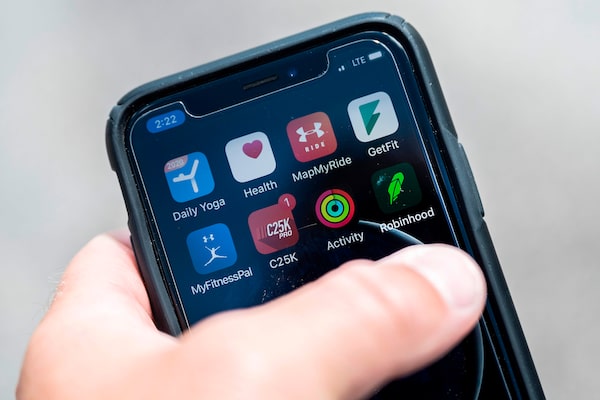
The Robinhood app, seen here on a phone on June 24, 2020, allows U.S. investors to cheaply and easily trade stocks.JIM WATSON/AFP/Getty Images
Young investors have been doing some questionable things with the new free stock-trading apps that have surged in popularity during the pandemic.
Let’s skip the finger-waving admonishments and just say that these investors are buying a motley mix of solid blue-chips, speculative stocks and silly stuff, and that they are trading excessively. Free trading apps, notably Robinhood in the U.S. and Wealthsimple Trade in Canada, dispense with the usual $5 to $10 commission to trade stocks using an online broker. Trading is so cheap and easy with these apps that it almost becomes a game.
Free-trading apps are a fad that will fade, probably not without damage done to those who have treated investing like a game. The stock-market surge since March is not a test of anyone’s investing ability – everyone looks like a star trader.
But free-trading apps can also be a force for good investing. Here’s how: Use them to build a super-cheap balanced-ETF portfolio.
Balanced exchange-traded funds are a fully diversified portfolio of stocks and bonds in a single purchase and they come in all kinds of flavours from companies such as Bank of Montreal, BlackRock, Horizons and Vanguard. There are conservative and income funds for older investors, balanced versions for the risk-averse and growth for younger and more aggressive investors. There’s also an all-stocks version that provides balance through exposure to stock markets around the world. This type of balanced ETF might work well for a twentysomething investor who is willing to take on more risk in exchange for higher potential returns.
Pick a balanced ETF – they’re also called asset-allocation ETFs – and then pound money into it whenever you can. Buy a share on Monday, one on Tuesday and two more on Friday if you have the money available. Channel the urge to trade into an investment in a fully diversified portfolio in line with your personal needs and investing approach.
Let’s be clear here – you’ll mainly be using free-trading apps to buy balanced ETFs that you’ll hold for 10-plus years. You might take profits from time to time if you’ve done well, but your main purpose will be to build wealth over the long term. Trading stocks on a daily or weekly basis may seem profitable now, but most people can’t consistently make decent money doing it.
The main reason why traders fail is that it’s brutally hard to be right over and over about when to buy and sell stocks. But costs are also an issue – stock-trading commissions can add up and erode returns.
Some online brokers let you buy ETFs without commissions, but they often make you pay the usual charge to sell. Also, online brokers may charge fees of $25 a month on small accounts. Free-trading apps dispense with these return-stealing costs, which means only the tiny fee charged on your ETFs applies. It’s taken off the top, by the way. The returns you see in your account are shown on an after-fee basis.
A thought for young investors who are big on free-trading apps: Ease off the gambling on stocks and start building wealth for the long run with balanced ETFs.
Be smart with your money. Get the latest investing insights delivered right to your inbox three times a week, with the Globe Investor newsletter. Sign up today.
 Rob Carrick
Rob Carrick